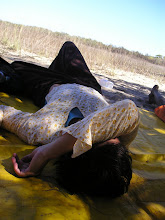These awesomely fabulous ladies are riding to Scotland. No, they are not leaving from London.
They are not even leaving from Paris. They are leaving from Thornbury, Melbourne, Victoria, Australia - well technically they have left.
I was lucky enough to be part of the small gathering that accompanied them for part of the first day. After riding for 30 or so kilometers on the Warburton trail my legs were a bit sore but I feel I don't have the right to complain considering the first 'leg' of the foon's journey was to Sydney.
Jude and Astrid (the foons in question), have an extraordinary kit all packed up on two custom made touring bicycles with four ortlieb panniers and some handle bar bags (see picture below).
However, Urban Dictionary, the source of all decent knowledge, describes a foon as "the proper defenition of foon (NOT AT ALL in fact having to do with anything sexually vulgar or "sporkish") comes from the description of a fast and therefore aerodynamic animal. The word was probably fashioned after fast andtyphoon or perhaps simply fuzzy. The word itself was invented in 1989 by two biracial linguists. A foon will have its ears laid back, flattened to its head while running or swimming and while in momentum is often seen waving head to toe in an undulating fashion. 2. v. foon can also be used as a verb to describe the action of the noun eg. The otter fooned through the water.; The otter is fooning through the water playfully. 3. A third usage of the word foon is when one would impose upon an animal or person into the appearance of being aerodynamic by laying back the ears or head manually or by force. eg. Four year old Shelia patted the head of her cat with such enthusiasm that she forced its ears back {fooned its ears back} and the cat remained fooning with annoyance as it swished its tail back and forth. (Can be used in present tense as well.)".
Urban dictionary also has six other definitions (including the one about the fork spoon). However the spelling error in the first sentence makes me trust this source less - call me Gen x. Let's just settle with these foon being aerodynamic animals.
Now back to the foons on bikes. Riding from Australia to Scotland is something to really wrap your head around. Aside from the obvious difficulties of being on a bike for hours at a time every day for years, YES YEARS, there are logistics. What do you do when the highway runs out of edge? Where do you stop for the night? Is this much water enough for today (although so far the foons seem far more obsessed with beer than water)? What if we end up in peak hour traffic in Sydney (yes this happened)?
Then there are the larger questions. How does one get from Australia, girt by sea, to anywhere else that is not Australia without flying? Why are we doing this anyway?
That last one is a curly one because I'm sure that as a foon on a bike you would start off with an idea in your head about why you had chosen to pack up your life and leave for years to ride a bike to the other side of the world. I wonder, though, does the answer change over time?
To quote a recent blog post from the foons: "Recently I have realised that it’s the distractions that make a journey great. Whether it be a place, side road, people or experience". So it's not the riding itself perhaps but the speed at which they are travelling that is making their 'dream come true'.
The thing that is most obvious from reading their blog is the joy in the everyday that is occurring for them. They really seem uplifted somehow and their troubles immediate and practical rather than ongoing frustration which is so easy to slip into as a city dweller. This pace allows them to develop a rhythm that reveals the nuances of the landscape and their relationship with themselves, and likely each other. I'd love to hear from you both about this Jude and Astrid.
Even with all the logistics and the philosophy behind such travel the thing that amuses me the most is thinking about the foons cruising into Scotland two or three years after leaving Melbourne, still wearing their 'borrowed' Melboure Bike Share helmets. Legends!

